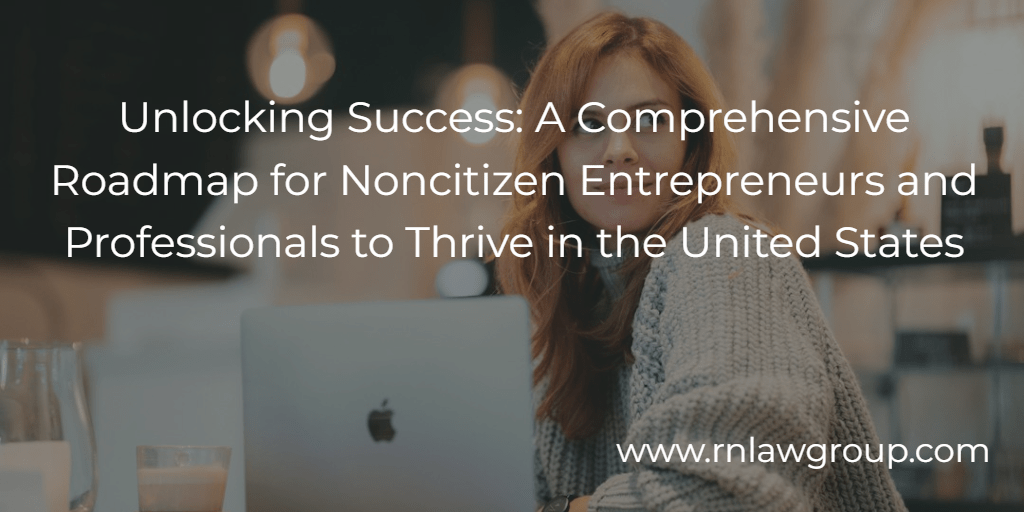
Unlocking Success: A Comprehensive Roadmap for Noncitizen Entrepreneurs and Professionals to Thrive in the United States
The United States has long been celebrated as a land of opportunity, attracting ambitious individuals from around the globe who seek to turn their entrepreneurial or professional dreams into reality. For noncitizen entrepreneurs, or noncitizen talent, navigating the complex landscape of U.S. immigration laws and regulations is essential for establishing and managing businesses in the country or to establish their professional career. This detailed guide aims to provide aspiring entrepreneurs and foreign talent with a comprehensive overview of the various temporary and permanent pathways available, along with key considerations to help them make informed decisions as they embark on their entrepreneurial or professional journey.
Understanding the Entrepreneurial Landscape:
- Temporary Pathways:
- International Entrepreneur Rule (IER): Introduced to facilitate foreign entrepreneurs in launching start-ups in the U.S., the IER offers a temporary parole status for entrepreneurs who meet specific criteria. To qualify, entrepreneurs must demonstrate substantial ownership and a central role in the operations of a start-up with high growth potential.
- B-1 Temporary Business Visitor Visa: Designed for individuals seeking to explore business opportunities in the U.S. without establishing permanent residency, the B-1 visa allows entrepreneurs to engage in activities such as securing funding, negotiating contracts, or attending business meetings related to their prospective ventures.
- E-2 Treaty Investor Visa: Entrepreneurs from countries with which the U.S. maintains treaties can apply for the E-2 visa, which requires a substantial investment in a U.S. enterprise. Applicants must demonstrate ownership or operational control and ensure that the business has the capacity for significant income generation.
- F-1 Optional Practical Training (OPT): F-1 students graduating from U.S. educational institutions can gain practical work experience through OPT, including starting a business related to their field of study. STEM OPT extensions are available for eligible entrepreneurs who meet specific criteria.
- H-1B Specialty Occupation Visa: Reserved for individuals with specialized skills or educational qualifications in specific fields, the H-1B visa allows entrepreneurs to work in the U.S. in occupations that require theoretical and practical application of highly specialized knowledge.
- L-1A Intracompany Transferee Visa (Managerial or Executive): Designed for multinational companies, the L-1A visa allows executives or managers to transfer to a U.S. branch, affiliate, or subsidiary. Entrepreneurs seeking to establish a new office in the U.S. can utilize this pathway, provided they meet certain requirements and demonstrate a managerial or executive role within the organization.
- L-1B Intracompany Transferee Visa (Specialized Knowledge): Similar to the L-1A visa, the L-1B visa allows for the transfer of employees with specialized knowledge to a U.S. branch, affiliate, or subsidiary. Entrepreneurs leveraging this pathway must demonstrate their specialized knowledge and its relevance to the U.S. business operations.
- O-1 Extraordinary Ability Visa: Recognizing individuals with extraordinary talent or achievements in their respective fields, the O-1 visa offers a pathway to temporary residency for entrepreneurs who demonstrate exceptional abilities or achievements. Applicants must provide extensive documentation of their extraordinary abilities and their significance to the U.S. economy or culture.
- Permanent Pathways:
- EB-1A Extraordinary Ability Visa: Recognizing individuals with extraordinary talent or achievements in their respective fields, the EB-1A visa offers a pathway to permanent residency without the need for a job offer or labor certification. Applicants must demonstrate sustained national or international acclaim and a commitment to benefiting the United States.
- EB-2 National Interest Waiver (NIW): Entrepreneurs with exceptional ability or advanced degrees may qualify for a national interest waiver, allowing them to bypass the job offer and labor certification requirements typically associated with employment-based visas. Applicants must demonstrate the national importance and potential benefits of their endeavors.
- EB-5 Immigrant Investor Program: Targeted at entrepreneurs willing to invest a significant amount of capital in U.S. enterprises, the EB-5 program offers a pathway to permanent residency for individuals who create jobs for qualifying employees. Applicants must invest in new commercial enterprises that stimulate economic growth and job creation.
Key Considerations for Noncitizen:
- Investment and Ownership: Understanding the financial commitments and ownership requirements associated with each pathway is crucial. From substantial capital investments to significant ownership stakes in start-up ventures, entrepreneurs must assess the financial implications of their chosen pathway.
- Role and Position: Certain pathways may mandate specific roles or positions within the start-up entity, such as active participation in operations, managerial responsibilities, or specialized skills related to the business. Entrepreneurs should evaluate their qualifications and ensure alignment with pathway requirements.
- Start-up Entity Requirements: Familiarizing oneself with the eligibility criteria for the start-up entity is essential. This includes ensuring lawful business operations, meeting formation timelines, assessing growth potential, and establishing relationships with foreign entities where necessary.
- Education and Skills: Entrepreneurs should assess their qualifications, expertise, and educational background to determine eligibility for pathways requiring extraordinary abilities, specialized knowledge, or advanced degrees. Understanding the educational and skill requirements of each pathway is crucial for successful application.
- Temporary vs. Permanent Status: Entrepreneurs should consider their long-term goals and aspirations when choosing between temporary and permanent residency options. While temporary pathways offer flexibility and short-term opportunities, permanent residency pathways provide stability and a pathway to citizenship.
Consultation and Resources:
Navigating the intricacies of U.S. immigration law can be challenging, and it is advisable for foreign nationals to seek guidance from immigration attorneys specializing in business immigration. Additionally, resources such as the official website of the U.S. Citizenship and Immigration Services (uscis.gov) offer valuable information on temporary and permanent pathways, the International Entrepreneur Rule, Optional Practical Training (OPT), and general employment guidelines in the U.S.
Conclusion:
For noncitizen, the United States presents a wealth of opportunities to innovate, grow businesses, further their careers and contribute to the economy. By understanding the diverse pathways available and carefully considering key factors such as investment requirements, roles, and long-term aspirations, aspiring entrepreneurs and professionals can embark on their journey with confidence, knowing they have a detailed roadmap to navigate the complexities of immigration and achieve success in the land of opportunity.
By: Felipe Jimenez
Felipe Jimenez is an Associate Attorney at Reddy Neumann Brown PC He works in the Non-Immigrant Visa (NIV) Department where he assists clients through all phases of the non-immigrant visa process.
Reddy Neumann Brown PC has been serving the business community for over 20 years and is Houston’s largest immigration law firm focused solely on US. Employment-based immigration. We work with both employers and their employees, helping them navigate the immigration process quickly and cost-effectively.

